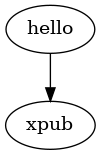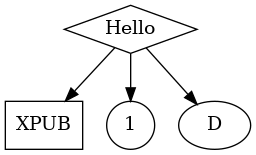Graphviz: Difference between revisions
No edit summary |
|||
| Line 13: | Line 13: | ||
==dot language== | ==dot language== | ||
<syntaxhighlight lang="dot"> | <syntaxhighlight lang="dot"> | ||
digraph | digraph { | ||
hello -> xpub | |||
} | |||
</syntaxhighlight> | |||
[[File:Hello-xpub.dot.png]] | |||
<syntaxhighlight lang="dot"> | |||
digraph { | |||
A [label="Hello" shape=diamond] | A [label="Hello" shape=diamond] | ||
| Line 26: | Line 34: | ||
</syntaxhighlight> | </syntaxhighlight> | ||
[[File:Hello.dot. | [[File:Hello.dot.png]] | ||
==Nodes and edges== | ==Nodes and edges== | ||
Revision as of 10:32, 30 September 2024
Graphviz is open source graph visualization software. Graph visualization is a way of representing structural information as diagrams of abstract graphs and networks. It has important applications in networking, bioinformatics, software engineering, database and web design, machine learning, and in visual interfaces for other technical domains.
- examples: https://renenyffenegger.ch/notes/tools/Graphviz/examples/index
- PythonGraphviz
- dot-to-ascii web editor: https://dot-to-ascii.ggerganov.com/
- graphs in the Aesthetic Programming book made with graphviz: https://aesthetic-programming.net/ (OSP, Winnie Soon, Geoff Cox)
- OSP workshop at Karlsruhe with etherdot: http://osp.kitchen/workshop/karlsruhe/ (June 2023)
dot language
digraph {
hello -> xpub
}
digraph {
A [label="Hello" shape=diamond]
B [label="XPUB" shape=box]
C [label="1" shape=circle]
A -> B
A -> C
A -> D
}
Nodes and edges
Graphviz works with nodes and edges:


